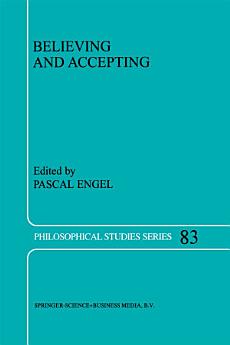Believing and Accepting
P. Engel
ডিচে ২০১২ · Philosophical Studies Series কিতাপ 83 · Springer Science & Business Media
ইবুক
302
পৃষ্ঠা
reportমূল্যাংকন আৰু পৰ্যালোচনা সত্যাপন কৰা হোৱা নাই অধিক জানক
এই ইবুকখনৰ বিষয়ে
(1) Beliefs are involuntary, and not nonnally subject to direct voluntary control. For instance I cannot believe at will that my trousers are on fire, or that the Dalai Lama is a living God, even if you pay me a large amount of money for believing such things. (2) Beliefs are nonnally shaped by evidence for what is believed, unless they are, in some sense, irrational. In general a belief is rational if it is proportioned to the degree of evidence that one has for its truth. In this sense, one often says that "beliefs aim at truth" . This is why it is, on the face of it, irrational to believe against the evidence that one has. A subject whose beliefs are not shaped by a concern for their truth, but by what she wants to be the case, is more or less a wishful thinker or a self-deceiver. (3) Beliefs are context independent, in the sense that at one time a subject believes something or does not believe it; she does not believe it relative to one context and not relative to another. For instance if I believe that Paris is a polluted city, I cannot believe that on Monday and not on Tuesday; that would be a change of belief, or a change of mind, but not a case of believing one thing in one context and another thing in another context. If I believe something, the belief is more or 4 less pennanent across various contexts.
এই ইবুকখনক মূল্যাংকন কৰক
আমাক আপোনাৰ মতামত জনাওক।
পঢ়াৰ নির্দেশাৱলী
স্মাৰ্টফ’ন আৰু টেবলেট
Android আৰু iPad/iPhoneৰ বাবে Google Play Books এপটো ইনষ্টল কৰক। ই স্বয়ংক্রিয়ভাৱে আপোনাৰ একাউণ্টৰ সৈতে ছিংক হয় আৰু আপুনি য'তে নাথাকক ত'তেই কোনো অডিঅ'বুক অনলাইন বা অফলাইনত শুনিবলৈ সুবিধা দিয়ে।
লেপটপ আৰু কম্পিউটাৰ
আপুনি কম্পিউটাৰৰ ৱেব ব্রাউজাৰ ব্যৱহাৰ কৰি Google Playত কিনা অডিঅ'বুকসমূহ শুনিব পাৰে।
ই-ৰীডাৰ আৰু অন্য ডিভাইচ
Kobo eReadersৰ দৰে ই-চিয়াঁহীৰ ডিভাইচসমূহত পঢ়িবলৈ, আপুনি এটা ফাইল ডাউনল’ড কৰি সেইটো আপোনাৰ ডিভাইচলৈ স্থানান্তৰণ কৰিব লাগিব। সমৰ্থিত ই-ৰিডাৰলৈ ফাইলটো কেনেকৈ স্থানান্তৰ কৰিব জানিবলৈ সহায় কেন্দ্ৰত থকা সবিশেষ নিৰ্দেশাৱলী চাওক।








